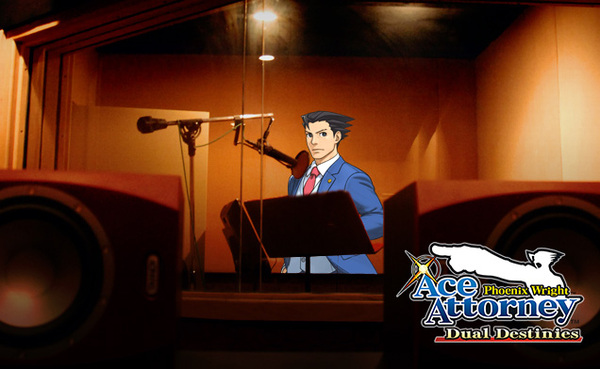
Revitalizing the Sounds of Life: Behind the Audio of Ace Attorney
Oct 31, 2013 // Janet Hsu
An in-depth look at the evolution of Ace Attorney’s sound design
Hi everyone! Janet here! Have you been enjoying Phoenix Wright: Ace Attorney – Dual Destinies ? It’s available right now for the Nintendo 3DS, only on the Nintendo eShop! If you haven’t played it yet, or *gasp* just didn’t know, I have a message for you!
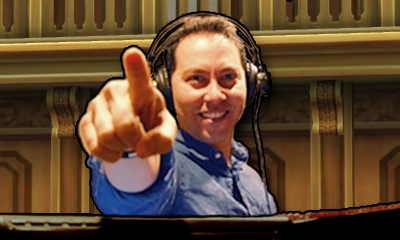
The only “Objection!” here should be the one coming out of Sam’s mouth, so go, Go, GO!
I’m sure some of you have finished the game already, but I hope you’ll stick around for just a little longer because, yes, there is one whole DLC episode waiting in the wings!
Last time, we started talking about the anime cutscenes, and as a natural extension, Mr. Seto talked about how after the footage was drawn, a lot of other things like layering on the characters’ voices and sound effects, and audio mixing had to occur to create the final version you see in the game. So this week, we have the Sound Director for Dual Destinies, Mr. Toshihiko Horiyama here to talk about how all the sounds in the game as well as the anime cutscenes were created or updated for the Nintendo 3DS. Take it away, Mr. Horiyama!
Hello, everyone. I’m Toshihiko Horiyama, and I’m the Sound Director for Dual Destinies. How have you been enjoying the game? I bet a number of you have even already finished it and are going for a second playthrough. Today, I’d like to share with you a little about the work we put into all of the sounds you hear in the game.
As many of you may have noticed from way back when you played the demo, the very first sound you hear in the game is the pounding of the judge’s gavel when you selected “New Game”. I’m willing to bet that some of you even noticed that the gavel sound has been remade for this game. We’ve used the same gavel sound effect from the very first Ace Attorney game through the fourth, Apollo Justice: Ace Attorney, but it’s been 12 years since the first GBA game came out in Japan and 6 years since the last time we used it in AJ: AA. “It’s probably time to remake it…” I thought to myself at the beginning of the project, which feels like it was only yesterday but is actually over 2 years ago. My, how time flies.
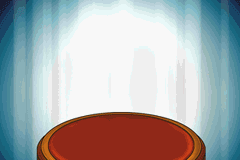
Getting back to the gavel sound, the original sound was meant to sound crisp and dry, but with a touch of warmth to it, but when I sat down to remake this sound, I re-imagined it as a sound where the initial sound peaks very quickly into the sound of its rich core. It’s like my way of representing Phoenix’s resolve to face the dark age of the law in a single sound effect. If I had to compare it to a food, I’d say it’s something like a piece of raw squid with a little dollop of wasabi on top. Huh? What do you mean “you don’t get it”? Well, try listening to it again and then you’ll see. (Note: Raw squid is super chewy, and wasabi is also known as “Japanese horseradish”. That said, even Japanese people would have a tough time understanding Mr. Horiyama’s comparison here, so don’t worry, it’s not just you. *laugh*)
This is the sort of process I went through as I considered what to do with each and every sound effect you hear in the game – the sound of the letters as they appear on-screen, the explosive sound when you are penalized, the “sha-keen!” sound you hear when a character says, “Objection!” I thought long and hard about how to preserve the iconic sounds as I tried to revitalize them, as though I were trying to distill the best of the old and new into a concentrate of brilliant new sounds for you to enjoy. Huh? What do you mean “you don’t get it”? Well, try playing the previous games again and comparing the sounds in those with the ones in Dual Destinies and then you’ll see.
Anyway, after I came up with the concept behind how the gavel sound should be remade, our team’s Sound Designer Mr. Amagishi took that concept and brought it to life.
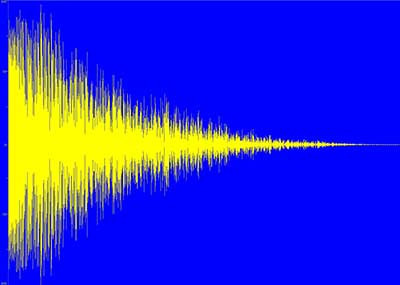
The waveform of the Dual Destiny gavel sound effect. As you can see, it is a sound where the bulk of it hits your ear right at the very beginning and then tapers off as its core sound continues to resonate
So, now that you’ve selected “New Game” and the game has started, the next thing that probably struck you sound-wise was the almost oppressive and suffocating melody of “The Dark Age of the Law”. This piece of music, along with all of the other wonderful tracks in the game, was composed by Mr. Noriyuki Iwadare, but he didn’t just compose them you know. Because the specs of the Nintendo 3DS are better than its predecessor, we were able to get more power out of it to bring you the actual, unprocessed sounds of Mr. Iwadare playing his trombone in this title track. There are other places in the soundtrack, sometimes in the melody and sometimes in the harmony, where you can hear actual instruments being used.
Speaking of the soundtrack, they’re all absolutely wonderful pieces and you can tell he had a really good time composing them. Almost all of the tracks this time are new, but there are plenty of old favorites such as Phoenix’s “Objection!” theme that make their return boasting new arrangements and remixes as well. However, the track to really pay attention to is the ending credits theme – it really is a tour de force! There are so many things I want to say about it, but it’s probably best if I just let you hear it for yourselves, though I’m sure some of you already understand what I mean when I say, “Ahh… I’m so glad I fought my way through the game so I could hear this song… No! Actually, I’m so glad I’ve fought my way through life so I could hear this song!”
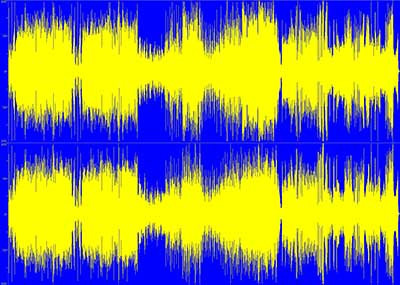
The peaks and troughs of the end credits’ waveform paint a picture of life’s joys and sadness
Finally, I’d like to touch on one more new sound-oriented feature in Dual Destinies: this game can automatically detect whether you have headphones plugged into your Nintendo 3DS or not and then optimize the sound output to produce the highest quality sound for that setup. So please feel free to play this game with or without headphones, safe in the knowledge you won’t be missing a note of Dual Destinies’s rich soundscape.
Thank you for sitting down with us, Mr. Horiyama! It’s hard to imagine redoing all those sounds, but every one of them turned out wonderfully! The soundtrack is definitely stellar, as always. I hope, no, I KNOW it will become as beloved as its predecessors.
Last week, I was talking about how I translated and adapted the anime cutscenes script and on the tails of that, I thought I’d continue with the actual voice recording session itself and the audio mixing that came after that this week.
Come with me now to Los Angeles, California!
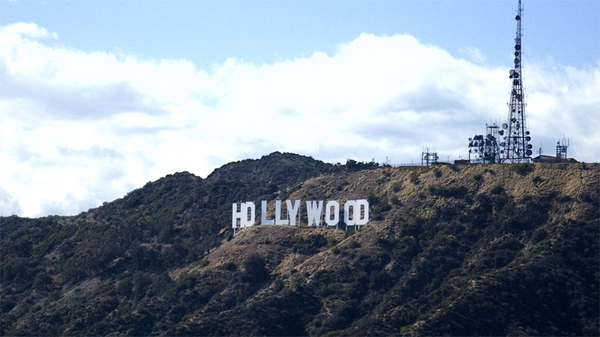
Mr. Horiyama and I went to visit Cup of Tea Productions Inc. in Burbank, which is just outside of downtown LA, where we were greeted by the lovely Lainie Bushey and Danni Hunt (the project manager, and the sound engineer and editor respectively). You may know of their studio from other games such as the “Tales of” series, “Katamari Forever”, and “Nier Replicant”. With a pedigree in quality voiceovers of Japanese games, we knew we were in good hands. After that, our voice director Sam Riegel joined our party, and we took a quick tour around the studio.
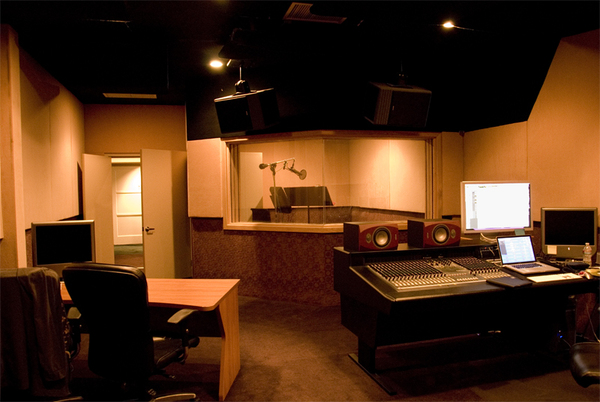
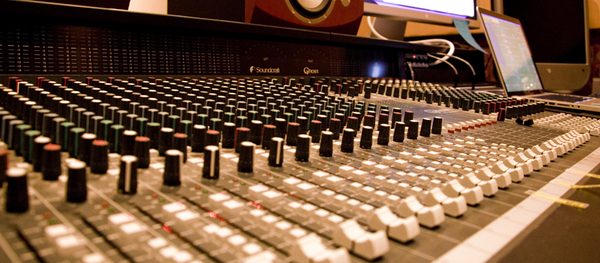
â’ªOh we be pirates, we love to sail the seven seas…â’ª
…of sliders and knobs (@@; )
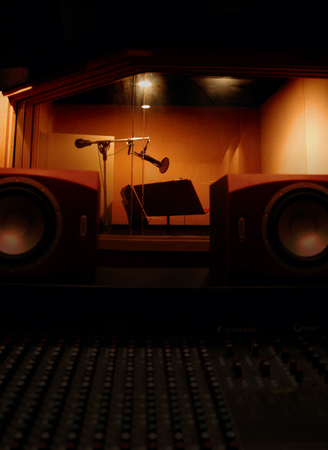
The recording booth looms in wait for its first victim, er, I mean… “Objection!” of the day.
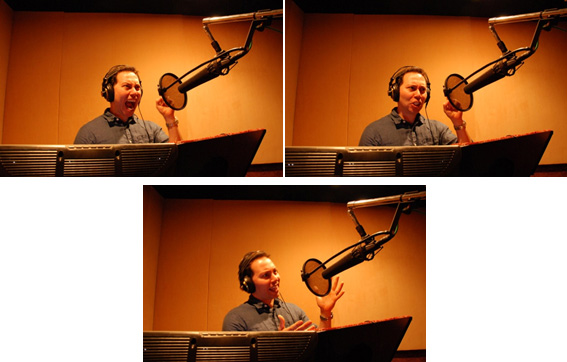
Sam showing me why HE’S the acting pro and not me.
After the tour and a quick cup of coffee, our first voice actor arrived and we went straight to work recording the dialogue. But before we get to the main event, I’d like to give you a basic breakdown of what each person at our recording was responsible for.
• Lainie (Project Manager) – Lainie managed the business side of the project, including scheduling the actors and making sure everyone’s contract is in place. She and Danni also provided the voice actors’ audition tracks for us when we were in the process of casting voices.
• Danni (Sound Engineer and Editing) – Danni operated the sound board and other equipment and controlled the recording software during the recording. Afterwards, she cleaned up the sounds and did some preliminary post-production audio processing to double-check that the clips weren’t all different volumes and to trim off some blank spaces in the beginning and ending of tracks.
• Sam (Voice Director) – Sam directed the voice actors to get the best performances we could using his knowledge as a professional, as well as made sure the lines felt natural and in sync with the footage. He advised us on which take was best when there were a few good ones to choose from as well.
• Mr. Horiyama (Sound Engineer/Advisor) – Since he attended the Japanese voice recordings, Mr. Horiyama was able to give us advice when something sounded too different from the Japanese version and back us up in keeping track of the lines that still needed recording. We could also consult him about game-specific technical issues as we were recording.
• Janet (Script Writer/Creative Director) – Because I knew the game’s plot and was the one that translated scripts, my job was to fill voice actors in on what was happening in the scene or what their motivation for the lines were. I was also able to convey to the voice actors how I wanted certain lines to be delivered in specific cases.
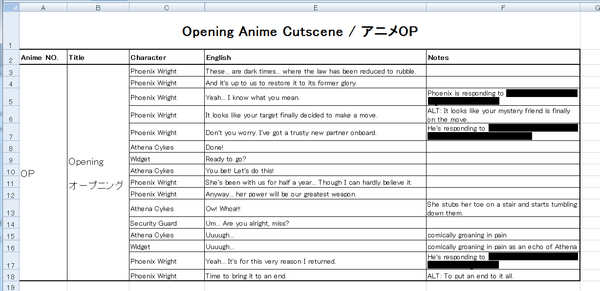
Nope, still not declassifying who Phoenix is talking to…Not unless you want me to spoil Episode â– â– â– for everyone!
The lines themselves are important, but in the studio, the notes in the Notes column become extra important. In this instance, I was fortunate enough to attend the entire recording, but sometimes with super large games, the script writer can’t attend even a part of, let alone the whole recording, so the notes become the lifeline between the actors and the script writer and lets them know the basic facts around each line. The information could be anything from who the character is talking to (the redacted bits in this case), to how the line should be delivered (Athena’s “comically groaning in pain” line). Depending on how the studio prefers to do it, alternate lines may go here as well or on their own separate lines.
Script in hand, the many talented voice actors took their turns one by one recording their lines with Sam and I directing them. By this time, we had the nearly final Japanese version of the anime cutscenes, so everyone could see where characters were speaking and how many lip flaps there would be for each line on their monitors. The trick to good dubbing is one part the script, which I mentioned last time (despite writing some alternate lines, we still had to re-write a few lines here and there on the fly in the studio), but the other is the skill of the voice actor to deliver the line in a way that makes it feel like it matches the visuals.
For example, if the footage has a character speaking very quickly with a lot of mouth flaps but the line is delivered with a slight drawl, the tension of the scene wouldn’t match up at all, and the mouth flaps would be all out of sync like a stereotypical 80’s kung-fu flick dub. But we were working with some of the most famous talents in the game and anime voice over world, so not only were they able to make each line sound good in less than 3 takes, but you can really hear the emotional nuances in each of their lines.
I have to admit, I don’t watch or play a ton of English dubbed anime and games because I understand Japanese now, but when I do on occasion indulge in them, I am consistently amazed at how good the voice actors in them are at their job. Watching them at work right in front of me did nothing but bring my respect for them up even higher. There were lines I had written where, by adding just the slightest hint of sadness or fear or happiness, the actors were able to really bring out the power and atmosphere behind the words in a way I had not expected. (And I thought I was good at hearing voices in my head as I write…!)
Some of you initially mentioned online that each of the characters’ “Objections!” sounds unique and emotive, and yes, that was on purpose and the benefit of using pros, unlike me and the other localization team members who have lent our voices to the characters over the years who were just shouting into a mic by comparison… If you have finished the game, I hope you’ll agree that the delivery of each line and interjection was spot on in context. And while I think any time you have new voice actors playing established characters it does take some time to adjust, I hope you’ll agree that the new voices are a perfect fit.
With all of the lines recorded, Mr. Horiyama and I bid a fond farewell to Danni, Lainie, and Sam and made our way home. Once Mr. Horiyama and I got back to Japan, we sat down with Sound Designers Mr. Amagishi and Mr. Takashi Moriguchi to mix and master the English lines into the anime cutscenes. One of the interesting things is that even here, there was some localization involved! You would think that sound is sound, and that everyone should have the same understanding of what sounds “natural”, but you would be surprised! One very obvious example of this is in the opening cutscene of Episode 4. If you are interested, try comparing the sound effects that were used in each version and you’ll see how what sounds natural culturally for a Japanese audience is not always the same as what sounds natural to us Westerners. In the case of the opening for Episode 4, it’s because of how Japanese movies tend to mix those kinds of scenes versus how Hollywood movies do it that we are each engrained with a different sense of what is “natural” or “appropriate” for those situations.
Another interesting issue is that when lines are recorded without sound effects and background music, what sounds clear enough to understand may become unintelligible once those effects are added on top. In those cases, it was up to me to help the sound team figure out how to make sure each line could be clearly heard. In some cases, it was to bring the volume of a certain consonant up, in others, it was to shift the sound a few frames up or down so that it didn’t clash with the soundtrack, or to just lower the volume of the background music altogether if we couldn’t do anything about the English line. The “Objection!” interjection was the biggest offender of “I can’t hear the “b” because it’s right on top of the “sha-keen” sound effect… Let me tell you, there were so many tears shed over this one word. But thankfully, the voice actors all gave us enough “b” sounds to work with. (Protip: To all you aspiring voice actors out there, I cannot overstress the importance of diction!)
And that about wraps it up. Thank you for reading–
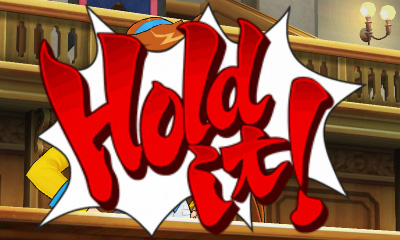
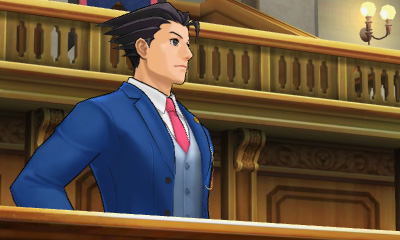
Phoenix: Aren’t you forgetting something?
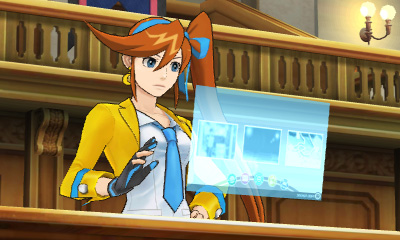
Janet: I… don’t think so…
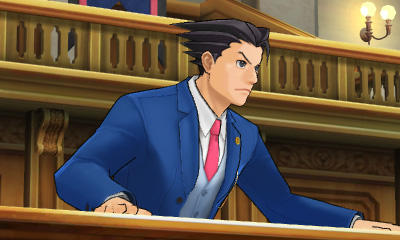
Phoenix: How about “my triumphant return to the courtroom”? You and the dev team still have to tell everyone why I would defend a killer “killer whale” for my first case back!
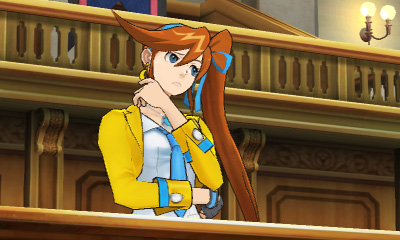
Janet: Um… I thought it was just you being… you.
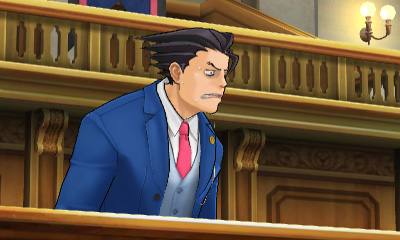
Phoenix: …………
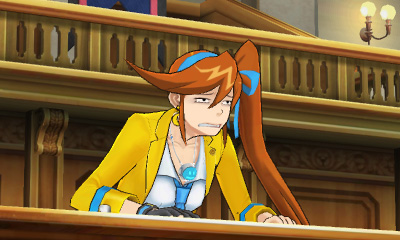
Janet: All right, all right! I’ll come back and talk about it. Just– put your distressed face away…
(Things Phoenix has learned in these past 8 years: crafty scheming, check.)
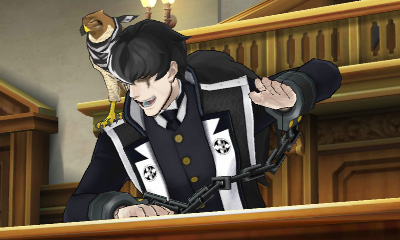
Simon: Oh, you solicitors are simply too much.
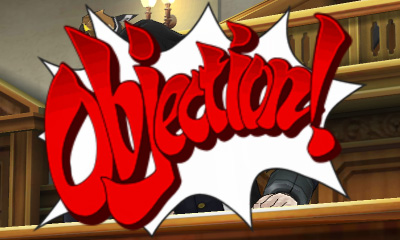
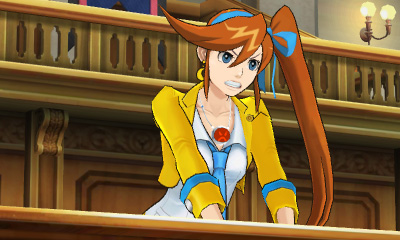
Janet: No one asked for YOUR opinion, Simon!
And on that note, I guess I will be back in the very near future to share some stories about Phoenix’s first case back as a lawyer. Keep an eye out for it!
Until then!
-
Brands:Tags:
-

Loading...
Platforms:
